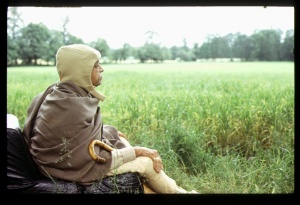CC Madhya 18.213: Difference between revisions
m (1 revision(s)) |
(Vanibot #0054 edit - transform synonyms into clickable links, which search similar occurrences) |
||
| (One intermediate revision by one other user not shown) | |||
| Line 1: | Line 1: | ||
{{ | [[Category:Sri Caitanya-caritamrta - Madhya-lila Chapter 18|c213]] | ||
<div style="float:left">'''[[Sri Caitanya-caritamrta|Śrī Caitanya-caritāmṛta]] - [[CC Madhya|Madhya-līlā]] - [[CC Madhya 18|Chapter 18: Lord Śrī Caitanya Mahāprabhu's Visit to Śrī Vṛndāvana]]'''</div> | |||
<div style="float:right">[[File:Go-previous.png|link=CC Madhya 18.212|Madhya-līlā 18.212]] '''[[CC Madhya 18.212|Madhya-līlā 18.212]] - [[CC Madhya 18.214|Madhya-līlā 18.214]]''' [[File:Go-next.png|link=CC Madhya 18.214|Madhya-līlā 18.214]]</div> | |||
{{CompareVersions|CC|Madhya 18.213|CC 1975|CC 1996}} | |||
{{RandomImage}} | |||
==== TEXT 213 ==== | ==== TEXT 213 ==== | ||
<div | <div class="verse"> | ||
aiche līlā kare prabhu śrī-kṛṣṇa-caitanya | :aiche līlā kare prabhu śrī-kṛṣṇa-caitanya | ||
‘paścime’ āsiyā kaila yavanādi dhanya | :‘paścime’ āsiyā kaila yavanādi dhanya | ||
</div> | </div> | ||
| Line 12: | Line 16: | ||
==== SYNONYMS ==== | ==== SYNONYMS ==== | ||
<div | <div class="synonyms"> | ||
''[//vanipedia.org/wiki/Special:VaniSearch?s=aiche&tab=syno_o&ds=1 aiche]'' — in that way; ''[//vanipedia.org/wiki/Special:VaniSearch?s=līlā&tab=syno_o&ds=1 līlā]'' — pastimes; ''[//vanipedia.org/wiki/Special:VaniSearch?s=kare&tab=syno_o&ds=1 kare]'' — performed; ''[//vanipedia.org/wiki/Special:VaniSearch?s=prabhu&tab=syno_o&ds=1 prabhu]'' — the Lord; ''[//vanipedia.org/wiki/Special:VaniSearch?s=śrī&tab=syno_o&ds=1 śrī]-[//vanipedia.org/wiki/Special:VaniSearch?s=kṛṣṇa&tab=syno_o&ds=1 kṛṣṇa]-[//vanipedia.org/wiki/Special:VaniSearch?s=caitanya&tab=syno_o&ds=1 caitanya]'' — Śrī Caitanya Mahāprabhu; ''[//vanipedia.org/wiki/Special:VaniSearch?s=paścime&tab=syno_o&ds=1 paścime]'' — to the western part of India; ''[//vanipedia.org/wiki/Special:VaniSearch?s=āsiyā&tab=syno_o&ds=1 āsiyā]'' — coming; ''[//vanipedia.org/wiki/Special:VaniSearch?s=kaila&tab=syno_o&ds=1 kaila]'' — made; ''[//vanipedia.org/wiki/Special:VaniSearch?s=yavana&tab=syno_o&ds=1 yavana]-[//vanipedia.org/wiki/Special:VaniSearch?s=ādi&tab=syno_o&ds=1 ādi]'' — meat-eaters and others; ''[//vanipedia.org/wiki/Special:VaniSearch?s=dhanya&tab=syno_o&ds=1 dhanya]'' — fortunate. | |||
</div> | </div> | ||
| Line 19: | Line 23: | ||
==== TRANSLATION ==== | ==== TRANSLATION ==== | ||
<div | <div class="translation"> | ||
In this way Lord Śrī Caitanya Mahāprabhu performed His pastimes. Coming to the western part of India, He bestowed good fortune upon the yavanas and mlecchas. | In this way Lord Śrī Caitanya Mahāprabhu performed His pastimes. Coming to the western part of India, He bestowed good fortune upon the yavanas and mlecchas. | ||
</div> | </div> | ||
| Line 26: | Line 30: | ||
==== PURPORT ==== | ==== PURPORT ==== | ||
<div | <div class="purport"> | ||
The word yavana means “meat-eater.” Anyone from a meat-eating community is called a yavana. One who does not strictly observe the Vedic regulative principles is called a mleccha. These words do not refer to any particular man. Even if a person is born in a brāhmaṇa, kṣatriya, vaiśya or śūdra family, he is a mleccha or yavana if he does not strictly follow the regulative principles or if he eats meat. | The word ''yavana'' means “meat-eater.” Anyone from a meat-eating community is called a ''yavana''. One who does not strictly observe the Vedic regulative principles is called a ''mleccha''. These words do not refer to any particular man. Even if a person is born in a ''brāhmaṇa'', ''kṣatriya'', ''vaiśya'' or ''śūdra'' family, he is a ''mleccha'' or ''yavana'' if he does not strictly follow the regulative principles or if he eats meat. | ||
</div> | </div> | ||
__NOTOC__ | |||
<div style="float:right; clear:both;">[[File:Go-previous.png|link=CC Madhya 18.212|Madhya-līlā 18.212]] '''[[CC Madhya 18.212|Madhya-līlā 18.212]] - [[CC Madhya 18.214|Madhya-līlā 18.214]]''' [[File:Go-next.png|link=CC Madhya 18.214|Madhya-līlā 18.214]]</div> | |||
__NOTOC__ | |||
__NOEDITSECTION__ | |||
Latest revision as of 22:21, 19 February 2024

A.C. Bhaktivedanta Swami Prabhupada
TEXT 213
- aiche līlā kare prabhu śrī-kṛṣṇa-caitanya
- ‘paścime’ āsiyā kaila yavanādi dhanya
SYNONYMS
aiche — in that way; līlā — pastimes; kare — performed; prabhu — the Lord; śrī-kṛṣṇa-caitanya — Śrī Caitanya Mahāprabhu; paścime — to the western part of India; āsiyā — coming; kaila — made; yavana-ādi — meat-eaters and others; dhanya — fortunate.
TRANSLATION
In this way Lord Śrī Caitanya Mahāprabhu performed His pastimes. Coming to the western part of India, He bestowed good fortune upon the yavanas and mlecchas.
PURPORT
The word yavana means “meat-eater.” Anyone from a meat-eating community is called a yavana. One who does not strictly observe the Vedic regulative principles is called a mleccha. These words do not refer to any particular man. Even if a person is born in a brāhmaṇa, kṣatriya, vaiśya or śūdra family, he is a mleccha or yavana if he does not strictly follow the regulative principles or if he eats meat.